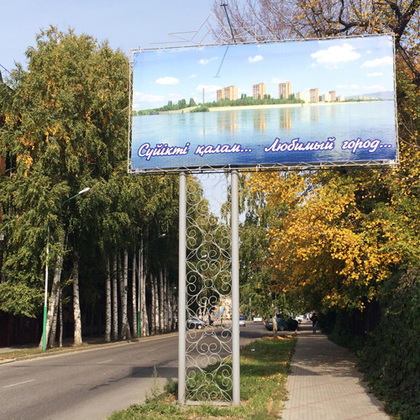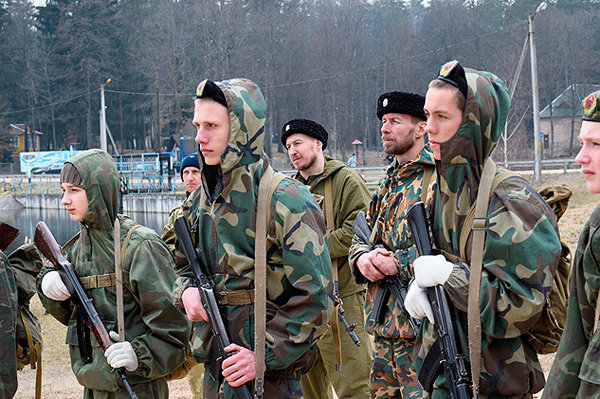The purpose of terrorism is to terrorize, to suggest that old rules and old expectations no longer apply and thereby increase uncertainty and fear. That explains why someone like Kseniya Sochak has suggested that she is next on Putin’s list now that the Kremlin has killed Boris Nemtsov and why an increasing number of countries around Russia are nervous.
From the point of terrorists be they states as in this case or sub-state actors, that is one of terrorism’s great strengths because it can often achieve its ends of destabilization, confusion and appeasement even if those engaging in it carry out only a few actions and then sit back and watch while others react.
And it is also why such terrorists benefit by denying or not taking responsibility for their actions and why they don’t want to be clear about what they plan to do next because those things in and of themselves increase uncertainty and lead some of their potential victims to talk in ways that alienate rather than attract the support they need in order to counter the threat.
At present, among those who feel most threatened by Putin’s potential actions are the Baltic countries and two of Moscow’s supposed allies, Kazakhstan and Belarus. That the latter are on this list is instructive: if Putin moved only against those who were clearly his enemies, he would be less terrifying; attacking those aren’t -- or aren’t yet -- makes him more so.
Like her Estonian colleague Toomas Hendrik Ilves, Lithuanian President Dalia Gribauskaite leaves no doubt that Putin is looking at the Baltic countries, has already begun an information war against them, and forced them into a position where each must be able to fight on its own against Russian forces before NATO forces can arrive.
Speaking yesterday on the occasion of the re-introduction of compulsory military service in Lithuania, Gribauskaite said that “the threat is very real” and that threat emanates not from somewhere abstract but from Russia.
Indeed, she suggested bluntly, Russia is “already attacking us. Will this grow into a conventional confrontation? No one knows. But already now be must defend ourselves from aggressive behavior like the increasing activity of Russian military units in Kaliningrad, and flights in the Baltic airspace, as well as propaganda and cyberattacks.
All this means that Lithuania and her Baltic neighbors are today “on the front line” in a new conflict.
The Lithuanian leader noted that Vilnius is very familiar with NATO procedures and that the alliance would need “little less than 72 hours” to come to the aid of its member countries in the Baltic states. Because the three are small, “we must be in a position to defend ourselves for 72 hours or perhaps longer.” And the Balts must do so in addition because it would be wrong to ask others to defend them if they were not defending themselves.
A second possible target of Putin’s attack is Kazakhstan, and Meduza.io’s Ilya Azar has provided important background on the prospects for a second Crimea among the ethnic Russians in the northern portion of that Central Asian country.
Following Moscow’s Anschluss of Crimea, Kazakhstan’s officials from President Nursultan Nazarbayev on down were alarmed by the possibility that Moscow might try the same thing in Kazakhstan not only because of the precedent of the failed Ust-Kamenogorsk Peoples Republic of 1999 but also because Putin dismissed the idea that Kazakhstan had been a state before 1917.
Astana tightened laws about separatism, and both ethnic Kazakhs and ethnic Russians in Kazakhstan began to talk about whether this was a real possibility or whether one or the other side was overreacting. The positions taken by each have exacerbated the feelings of the other, with Russian statements feeding into Kazakh ones and vice versa.
Ethnic Russians have noted that prior to 1900, what is northern Kazakhstan now was populated almost exclusively by Russian Cossacks, that it and indeed the rest of the republic were initially part of the RSFSR with a capital at Orenburg, and that Moscow had developed the whole region. Moreover, as late as 1989, Russians formed the majority of the population there.
Ethnic Kazakhs insist that Kazakhs lived in eastern Kazakhstan well before the Russians appeared, and they dismissed complaints about the status of the Russian language and the level of local autonomy as unwarranted given that Russian still dominates many sectors and the question of the unitary nature of the state is for Kazakhstan and not Russia to decide.
Indeed, many Kazakhs say it would be better to have more of the schools teach Kazakh, while some Russians connected with the “Russian world” idea complain that the schools in northern Kazakhstan may be in the Russian language but that “they are not Russian” because they don’t teach the same subjects with the same emphasis as schools in Russia do.
Ethnic Russians are leaving the region, and more are likely to given Russian expectations that “sooner or later Kazakhstan will go over to a state language,” as a result of which Russians will feel themselves “uncomfortable” and prefer to move, in the words of one, “rather than begin studying Kazakh.”
The events in Ukraine deepened this divide, with Kazakhs displaying “a palpable fear of Russia” and ethnic Russians a clear expectation that Moscow will come and include them within the Russian Federation, Azar says. Despite that relations between the two have remained relatively stable, and most doubt there is a possibility of a Crimea-type action in Kazakhstan.
But no one can dismiss it entirely given that, in the words of one Russian journalist there, “90 percent of ethnic Russians in Eastern Kazakhstan would be glad if ‘polite people’ should arrive.” That reality has changed how ethnic Kazakhs view them and of course both things are changing how ethnic Russians there view themselves.
According to one local political scientist, an ethnic Russian who doesn’t believe a Crimean scenario is likely, that changes everything: “If Putin believes that Russians in Kazakhstan are being persecuted, then he will not be against the creation of conditions for real actions” against Astana.
For the time being, however, he insists, Putin doesn’t need a “separatist” situation in Asia because that could provoke “Russian separatism in the Urals and in Siberia,” something the Kremlin leader wants to avoid at all costs.
And a third case which in many ways is the most interesting because it is the most complicated and unexpected concerns Belarus whose leader Alyaksandr Lukashenka has simultaneously been Moscow’s closest ally and among the most outspoken critics of Putin’s policies in Ukraine.
While almost everyone shares the view of former RISI analyst Aleksandr Sytin that Lukashenka has no interest in openly fighting with Russia, it is now very much unclear whether he is loyal enough given Vladimir Putin’s ever-tighter definition of what that consists of. And that is all the more clear now that Mensk is reorganizing its army to counter a hybrid war.
Indeed, as NR2 analyst Kseniya Kirillova notes, Moscow has been sending Lukashenka clear warning signs about that, and she advises in a commentary today that Mensk “should focus” on these signals and try to increase the autonomy of the Belarusian military “while there is still time.”
Other post-Soviet states, most notably Georgia, are also concerned, but the last few days have brought warning signs that other countries may be at risk as well and not just from the nuclear blackmail that Putin has sought to use against Europe and the West more generally over the past weeks.
In Finland, a new book has been published documenting Russian penetration of Finland, a country that was never part of the USSR but was part of tsarist Russia, and calling on the government them to engage in lustration to limit the possibility that this penetration could presage a Moscow move against that Scandinavian country.
And even more disturbingly, one analyst has proposed what he calls a series of “gloomy scenarios” in which Moscow might seek to project power far beyond the borders of the Russian Federation or even the former USSR and demand bases and control in much of northern Europe.
One hopes and prays that there is nothing behind such suggestions, but the very nature of the kind of state terrorism Vladimir Putin is engaged in means that they cannot be dismissed out of hand and that there is a compelling need for new measures to track and then counter his actions lest they lead to one or more disasters in the future.





